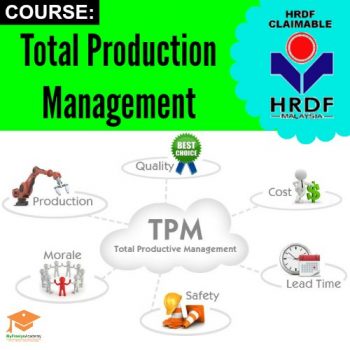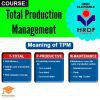Total Production Management
Original price was: RM2,600.00.RM1,450.00Current price is: RM1,450.00.
 |
IntroductionTPM is an evolving process, starting from a Japanese idea that can be traced back to 1951, when preventive maintenance was introduced into Japan from the USA (Dr. Deming). Nippondenso, part of Toyota, was the first company in Japan to introduce plant wide preventive maintenance in 1960. In preventive maintenance operators produced goods using machines and the maintenance group was dedicated to the work of maintaining those machines. However with the high level of automation of Nippondenso, maintenance became a problem as so many more maintenance personnel were now required. So the management decided that much of the routine maintenance of equipment would now be carried out by the operators themselves, this routine maintenance by operator is known as Autonomous Maintenance (one feature of TPM). This is done because the operator has a better understanding of the how the equipment works on a daily basis, can tell if an issue is appearing, can tell if quality is decreasing, and, through constant learning, is allowed to follow towards a better career path. Maintenance group took up only essential maintenance works. Thus Nippondenso, which already followed preventive maintenance, also added Autonomous maintenance done by production operators. The maintenance crew went in the equipment modification for improving reliability. The modifications were made or incorporated in new equipment. This leads to maintenance prevention. Thus preventive maintenance along with Maintenance prevention and Maintainability Improvement gave birth to Production management. The aim of production management was to maximize plant and equipment effectiveness. By then Nippondenso already had quality circles which involved the employees in changes. Therefore, now, all employees took part in implementing Production management. Based on these developments Nippondenso was awarded the distinguished plant prize for developing and implementing TPM, by the Japanese Institute of Plant Engineers (JIPE). Then in the 1970s, TPM evolved to a strategy focused on achieving Production Management efficiency through a comprehensive system based on respect for individuals and total employee participation. It was at this time that “Total” was added to production management. By the mid-1970s, the Japanese began to teach TPM strategies internationally and were recognized for their results. This process was an evolutionary one that took time, because of the efforts to change the organizational culture so that it valued the “Total” concept. How Will You BenefitUpon completion of this programme, the participants will be able to :
Who Should AttendThis program is suitable for Managers, Section Heads, Engineers, Supervisors, Line Leaders. Personnel from production, quality control/assurance, maintenance and engineering Level for Executives and above MethodologyThis stimulating program will maximizes the understanding and learning through lecture, discussion, case studies and practical activities. Module
|
Fee: RM 1,450 per pax
Loyalty Points: 1450 Points
Duration: 2 Days
Note: In-house course is available. Request it HERE
Trainer
Yim Sze Khuen
Biodata:
Yim Sze Khuen is a Certified Six Sigma Black Belt. A full time continuous improvement management consultant and trainer, he works on projects and trains personnel on Quality Management and Six Sigma Tools and Methodology. His elaborate 18 years background in the industry in various capacities has given him valuable experience in working with people from different backgrounds and cultures. He has served in several well established organizations and has held various influential positions in inculcating Six Sigma continuous improvement culture into organizations. He has completed a total of 18 Black Belt Projects (Corporate Improvement Projects) with a cumulative cost savings of USD8Million. Amongst some of the well established organizations he has worked in before were Penang Seagate Technology, Carsem Semiconductor, Flextronics Technology and Digi Telecommunication.



